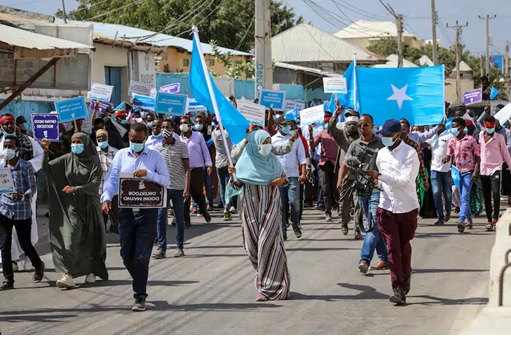By Max Bearak

NAIROBI — Gun and mortar fire could be heard in central Mogadishu on Friday morning amid a lockdown imposed by the Somali government — a measure ostensibly intended to enforce social distancing but timed to coincide with mass protests called by opposition parties.

Somalia has been in a constitutional crisis for nearly two weeks after an agreed-upon election date, Feb. 8, passed with no voting, leaving President Mohamed Abdullahi Mohamed, widely known as “Farmajo,” without a mandate, his opponents said.
Negotiations on a new date have failed, and Somalia’s fragile and often violent politics have exploded into acrimony. Political chaos could unravel a decade’s work in shoring up the stability of the country’s federal government, which is trying to recover control over the country’s territory and economy from the al-Qaeda-affiliated militant group al-Shabab.
The clashes also come at a delicate moment when security forces fear they could be used for political purposes, especially since the United States withdrew its advisers from the country in a last-minute Trump administration decision last month.
Early Friday morning, a hotel where two major opposition candidates were staying came under heavy gunfire in what one — Farmajo’s former deputy, Hassan Ali Khaire — called a crude assassination attempt.
Another candidate, former president Sharif Sheikh Ahmed, said the “attack was ordered by outgoing president Mohamed Farmajo.”
Later on Friday, a street protest led by Khaire came under fire, and videos shared by journalists on social media showed him and supporters ducking for cover. Local authorities announced the closure of Mogadishu’s airport.
“I am very sorry for what happened last night and this morning in Mogadishu,” said Mohamed Hussein Roble, the prime minister, in a recorded address. “We tried our best to avoid it. Peaceful demonstrations are a constitutional right, but armed demonstrations are not. Elections will take place, and I say to the people: Do not let the peace you have suffered for be destroyed.”
Roble did not say whether government forces shot at protesters or whether he considered opposition candidates’ security details to be protesters.
The process of moving toward eventual elections seemed as precarious as ever on Friday, with what was essentially a political stalemate devolving into gunfire in Mogadishu’s streets.
“It’s a moment of great uncertainty. There’s still no consensus on how to move forward, and the opposition is getting frustrated. This has resulted in the clashes in Mogadishu this morning, as they moved ahead to organize protests,” said Omar Mahmood, senior analyst for Somalia at the International Crisis Group.
Somalia’s main partners — and funders — in Washington urged an end to the violence and an immediate conclusion to negotiations on a new election.
The outgoing Trump administration ordered the removal of around 700 U.S. security personnel from Somalia by January, who were then repositioned on bases in neighboring Kenya and Djibouti, where they continue to advise and train Somali special forces.
Farmajo, who often spoke fondly of President Donald Trump, did not protest the decision. The U.S. government has poured billions into Somalia over the past decade.
“Quickly resolving the current electoral impasse is critical to Somalia’s future,” a statement from the U.S. Embassy in Mogadishu said, soon after the Feb. 8 election date was missed. “It is the responsibility and the duty of national and regional leaders to put aside the search for political advantage and instead act in the interests of the people of Somalia, who deserve the best from their leaders. Now is the time to resolve outstanding issues and finish the job of holding elections.”
The protests in Mogadishu had been called by Abdirahman Abdishakur, an opposition candidate who has repeatedly accused Farmajo of seeking to stay in power indefinitely through the manipulation of the election by colluding with the director of the national intelligence agency. With the election’s date undetermined for now, Abdishakur has been calling for Farmajo to resign.
“They are occupying Somalia without any political mandate,” he said in a phone interview. “He should not believe that he can get away with it. He cannot create such a dangerous precedent. This supposed leader has shown no desire to compromise and now he has lost his legitimacy. So we will mobilize the people.”
Source: Washington Post


